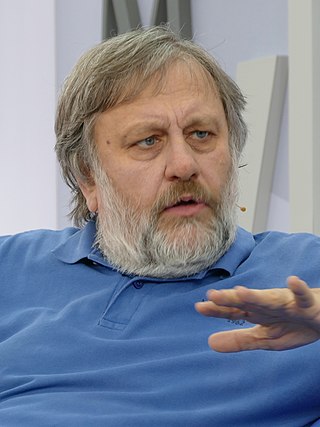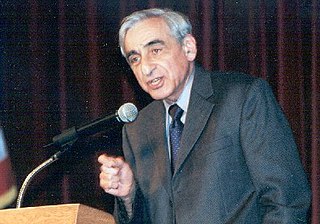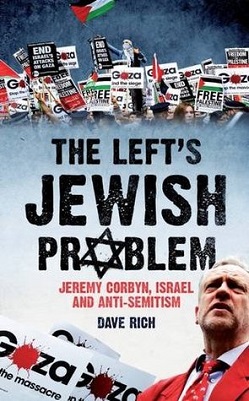
Slavoj Žižek is a Slovenian philosopher, cultural theorist and public intellectual. He is international director of the Birkbeck Institute for the Humanities at the University of London, visiting professor at New York University and a senior researcher at the University of Ljubljana's Department of Philosophy. He primarily works on continental philosophy and political theory, as well as film criticism and theology.

Ernesto Laclau was an Argentine political theorist and philosopher. He is often described as an 'inventor' of post-Marxist political theory. He is well known for his collaborations with his long-term partner, Chantal Mouffe.
New antisemitism is the concept that a new form of antisemitism which developed in the late 20th and early 21st centuries, tends to manifest itself as anti-Zionism and criticism of the Israeli government. The concept is included in some definitions of antisemitism, such as the Working Definition of Antisemitism and the 3D test of antisemitism. The concept dates to the early 1970s, although the identification of anti-Zionism with antisemitism has "long been de rigueur in Jewish communal and broader pro-Israel circles".

Michael Laban Walzer is an American political theorist and public intellectual. A professor emeritus at the Institute for Advanced Study (IAS) in Princeton, New Jersey, he is editor emeritus of Dissent, an intellectual magazine that he has been affiliated with since his years as an undergraduate at Brandeis University. He has written books and essays on a wide range of topics—many in political ethics—including just and unjust wars, nationalism, ethnicity, Zionism, economic justice, social criticism, radicalism, tolerance, and political obligation. He is also a contributing editor to The New Republic. To date, he has written 27 books and published over 300 articles, essays, and book reviews in Dissent, The New Republic, The New York Review of Books, The New Yorker, The New York Times, Harpers, and many philosophical and political science journals.
Paul Lawrence Berman is an American writer on politics and literature.
The Euston Manifesto is a 2006 declaration of principles signed by a group of academics, journalists and activists based in the United Kingdom, named after the Euston Road in London where it had its meetings. The statement was a reaction to what the writers argued to be widespread violations of left-wing principles by others who were commonly associated with the Left. The manifesto states that "the reconfiguration of progressive opinion that we aim for involves drawing a line between forces on the Left that remain true to its authentic values, and currents that have lately shown themselves rather too flexible about these values".
Harry's Place is a British political blog concerned with what the website writers perceive as extremism of the right and left, as well as anti-Zionism and antisemitism.
The Britain Israel Communications and Research Centre (BICOM) is a UK-based organisation which acts to promote awareness of Israel and the Middle East in the United Kingdom. BICOM publishes materials such as briefings and a journal, Fathom, covering the history, economy, culture and politics of Israel, Middle East peace plans, terrorism in the Middle East, UK-Israel relations and foreign policy.
The pro-war Left was a grouping of British left wing journalists and bloggers who supported for the 2003 invasion of Iraq, at variance with much of the rest of the British Left, which opposed it. They were centered on the Euston manifesto. which in October 2007 had 2,929 signatories. The name is derived from the pro-war group the Undertakers.
The Israel lobby in the United Kingdom is a term sometimes used to describe individuals and groups which seek to influence the foreign policy of the United Kingdom in favour of bilateral ties with Israel, Zionism, Israel, or the policies of the Israeli government. Such individuals and groups may seek to influence politicians and political parties, the media, the general public or specific groups or sectors.
David Hirsh is a Senior Lecturer in Sociology at Goldsmiths, University of London, and co-founder of Engage, a campaign against the academic boycott of Israel.
Mitchell Cohen is an author, essayist and critic, He is professor of political science at Baruch College of the City University of New York and the CUNY Graduate Center. From 1991 to 2009, he was co-editor of Dissent, one of the United States' leading intellectual quarterlies. He is now an Editor Emeritus.
Marko Attila Hoare is a British historian of the former Yugoslavia who also writes about current affairs, especially Southeast Europe, including Turkey and the Caucasus. Marko is Associate Professor of History at the University Sarajevo School of Science and Technology, in Sarajevo.
Democratiya was a free quarterly online review of books with the aim to "stimulate discussion of radical democratic political theory". Sixteen editions were produced from 2005 until a final edition in Autumn 2009, after which Democratiya merged with Dissent magazine.

The Left's Jewish Problem: Jeremy Corbyn, Israel and Anti‑Semitism is a 2016 book by Dave Rich. The book argues that new antisemitism is "masked as anti-Zionism" in left-wing politics.
Dave Rich is Head of Policy at the Community Security Trust and is a leading expert on left-wing antisemitism, according to The Jewish Chronicle. He is an associate research fellow at the Pears Institute for the Study of Antisemitism, where he completed his PhD. Rich's first book, published in 2016, The Left's Jewish Problem: Jeremy Corbyn, Israel and Anti‑Semitism began as his doctoral dissertation. He has since written Everyday Hate, published in 2023.

The Peterson–Žižek debate, officially titled Happiness: Capitalism vs. Marxism, was a debate between the Canadian psychologist Jordan Peterson and the Slovenian philosopher Slavoj Žižek on the relationship between Marxism, capitalism, and happiness. Moderated by Stephen J. Blackwood, it was held before an audience of 3,000 at Meridian Hall in Toronto on 19 April 2019.

The Jerusalem Declaration on Antisemitism (JDA) is a document meant to outline the bounds of antisemitic speech and conduct, particularly with regard to Zionism, Israel and Palestine. Its creation was motivated by a desire to confront antisemitism and by objections to the IHRA Definition of Antisemitism, which critics have said stifles legitimate criticism of the Israeli government and curbs free speech. The drafting of the declaration was initiated in June 2020 under the auspices of the Van Leer Institute in Jerusalem by eight coordinators, most of whom were university professors. Upon its completion the declaration was signed by about 200 scholars in various fields and released in March 2021.
Zionist antisemitism is the phenomenon in which individuals, groups, or governments support the Zionist movement and the State of Israel while simultaneously holding antisemitic views about Jews. In some cases, Zionism may be promoted for explicitly antisemitic reasons. The prevalence of antisemitism has been widely noted within the Christian Zionist movement, whose adherents may hold antisemitic beliefs about Jews while also supporting Zionism for eschatological reasons. Antisemitic right-wing nationalists, particularly in Europe and the United States, sometimes support the Zionist movement because they wish for Jews to be expelled, or for Jews to emigrate to Israel, or because they view Israel as a supremacist ethnno-state to be admired and held up as a model for their own countries.






